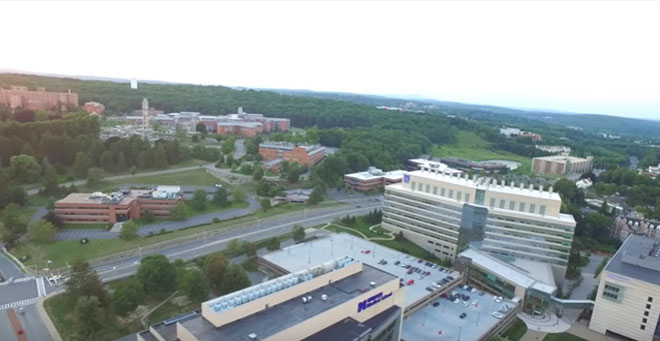Discussion of land acknowledgment is step toward more diverse, inclusive institution
UMass Chan Medical School working with Nipmuc Nation to craft land acknowledgment
UMass Chan Medical School’s Diversity and Inclusion Office facilitated the first of its “Centering the Margins” series on Wednesday, Sept. 15, with a discussion focused on a land acknowledgement for the Nipmuc Nation.
“This series is a time and a space for us to have informal dialogue around the unique experiences related to diverse communities,” said Marlina Duncan, EdD, vice chancellor for diversity and inclusion.

A land acknowledgment is a statement that formalizes the recognition of the indigenous peoples who first inhabited the land that cities and towns now occupy. In addition, land acknowledgements recognize the forced removal of indigenous peoples from their ancestral homes and the descendants of those people who live in the community.
The event, which featured a presentation from research librarians from the Lamar Soutter Library, informed participants that UMass Chan sits on the ancestral lands of the Nipmuc people, and it is likely that parts of the Medical School are built on burial grounds. Recognized in 1976 by the Commonwealth of Massachusetts, the Nipmuc Nation, like all the indigenous tribes of the United States, has dealt with the history and trauma of their lands taken through violence and their personhood denied for generations. The nation was once concentrated on a three-acre plot in Grafton, but the last person to live on that reservation died in 2006. Today, many Nipmuc live and work throughout Central Massachusetts.
In her presentation, Kimberly MacKenzie, data & scholarly communications librarian, referenced the UMass Chan Impact 2025 Strategic Plan in which the school pledges to take on a more meaningful and visible leadership role in promoting health and wellness of special populations in the Central Massachusetts region and across the commonwealth.
“Part of that special population includes Native Americans,” Mackenzie said.
The highlight of the event was the presence of Cheryll Holley, chief of the Nipmuc Nation, who addressed event participants.
“Land acknowledgments can be difficult for us because in this time of day, everybody is trying to prove that they can diversify and can support people that are different from them and sometimes a land acknowledgment is just that little checkbox for them,” Holley said. “We prefer to have a relationship with the people we assist with land acknowledgments.”
Holley spoke of the ongoing relationships the tribe has had with UMass Chan, noting its work with researchers, which found diabetes and high blood pressure as major health concerns among her people.
The tribe has started to look at its proximity to food deserts and lack of access to healthier foods as a major contributor to an increase in diabetes among its population. Tribal activists have been empowering their communities to eat better as one way of addressing the issue. Holley’s hope is that another collaboration with UMass Chan can provide research funding and grants to study and address the effects of food deserts on indigenous people’s long-term health. Holley said she hoped UMass Chan would work with the tribe.
Duncan said she is looking to form a committee to examine the needs of the population.
The land acknowledgment, when crafted, will be read at formal UMass Chan gatherings such as Commencement and Convocation.